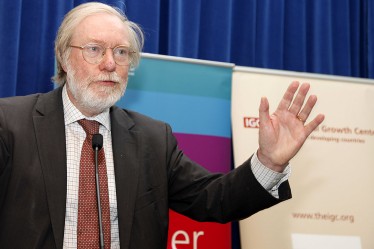Last week I wrote about the importance of protecting our forests. But earlier this week I heard one of the world’s leading development economists say that, “sometimes the right thing to do is to cut down a forest,” if it was essential for development and growth. Does this make me what Paul Collier calls a “fundamentalist environmentalist” I wondered?
Paul Collier is Academic Director of the DFID-initiated International Growth Centre and he was in our London offices on Tuesday to present his new book, The Plundered Planet. The book is about the management – and mismanagement – of natural assets, such as gold or oil.
He started with a stunning statistic. We all think of Africa as being extremely rich in natural resources – so much so that we often hear of how those resources have been plundered or used for corrupt ends, thus deepening, rather than easing, Africa’s poverty.

Yet it turns out that under the surface of the rich countries of the world, which cover a quarter of the Earth’s surface, every square mile houses $300,000-worth of natural assets. Yet under Africa’s surface, we’re aware of only $60,000-worth under every square mile. This means there are gigantic quantities of resources yet to be found on that continent. Just a few days ago, the New York Times reported that $1 trillion of minerals has been discovered in Afghanistan. How their exploitation is managed – and how their monetary value is invested – could make or break the world’s efforts to fight poverty. Collier’s book seeks to harness the up side of this likely “tidal wave of resource discoveries.” He calls the need to avoid history repeating itself, “the first order issue of the next decade”.
To do this, he says, he needs to build common ground between the economists of the world, and the environmentalists. This has lots of resonance with my job, where I am daily thinking about the win-wins between economic growth and the reduction of greenhouse gas emissions. Collier describes “fundamentalist environmentalism” – which he says can be romanticist and anti-scientific – as “at loggerheads with development.” But I reckon there’s a middle ground, where people like me work.
Standing at the back with me was my colleague Paul Healey, from our Growth and Investment Group. We struck up a conversation after the event, which helped me to understand where Collier sees this “common ground”. Paul (Healey, that is) pointed out Collier’s take on natural riches. They’re not like cash, stocks or other assets – we didn’t make them. We do have the right to use them, but they aren’t wholly ours. These natural assets also belong to future generations.
Therefore, we should make sure future generations get some benefit from them – either directly or indirectly. This means that we can save (preserve) them, or invest them wisely, but we should not only consume the products of the environment, as many countries have done. But for my colleague Paul, the big question was how do we ensure the exploitation of natural resources is of long term benefit for developing countries? Or to look at it the other way: how many poor nations do we all know that have been exploiting oil resources for decades and not been able to successfully invest the revenues from them?
As Mr. Healey (as I’m going to call him to save misunderstanding!) noted, the core problem is this: to manage oil, gas and mineral discovery you need stable, democratic, accountable and highly competent and informed societies and governments. So what can poor and less prepared countries do?
Paul Collier gives us a few options – one of the most interesting is the “invest in investing” approach, which envisages building the capacity of countries to invest their resource income effectively. This would solve the paradox that when poor countries get rich from oil, they can end up not being able to invest it wisely. Mr. Healey reckons that if you combine this sort of "invest in investing" approach with the sort of industrial development discussed by Rodrick and the Growth Commission, then we might have the beginnings of a new (or reinvented) investment focus.
And what are we doing in all of this? DFID is supporting the International Growth Centre, which is giving countries advice on how to manage resources and investment effectively. A good example of this is Ethiopia - a country grappling with how to promote growth in both agriculture and more innovative industrial sectors. And hopefully there will be many more to success stories to come.
Listen to Paul Collier's talk from the DFID Speaker Series


1 comment
Comment by Brian Lucas posted on
The latest news on this is of course the announcement of a trillion dollars' worth of minerals in Afghanistan. Rather than this being taken as good news, one economist interviewed about this on the radio amusingly reacted, "oh [bleeped] this is real trouble." (http://www.npr.org/blogs/money/2010/06/18/127936862/the-friday-podcast-too-much-lithium-is-depressing)
The "resource curse" isn't always a route to conflict, but it seems unfortunately hard to manage as a source of wealth. Well, I guess we see the same with lottery winners, don't we! http://iddbirmingham.wordpress.com/2010/07/01/afghanistan-and-the-resource-curse/